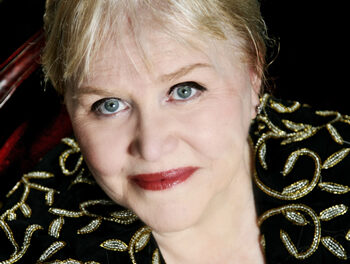So as we headed west, my companion asked, “Why are we driving this far to hear a bad performance?” Because it’s RTOOT, quoth I – the Really Terrible Orchestra of the Triangle.
She was right (as in correct), of course – as she always is. There are lots of bad performances. By the law of averages, half of what we hear is awful, and even CVNC‘s refined selection process ups the ante only marginally. We don’t really need to make a special effort to seek them out.
We pressed on in silence, arriving at the Cary Arts Center just in the time of Nick, as in Nick Shadow, devil incarnate….
On the very eve of Pearl Harbor Day, the auditorium was substantially full. Surely, I thought, there are better ways to mark such a solemn occasion, this far into the holiday season….
It was actually a pretty solemn occasion, no kidding. RTOOT’s founding conductor, its loco parentis with emphasis on loco (as in crazy), died earlier this year, in a terrible accident on a mountaintop in Western NC. I’d known W. Sands Hobgood, aka Sandy, since college. There have been few more brilliant and engaging souls in my circle of friends. His premature departure from our midst shook many of his admirers and associates and made some of us wonder what the future held for his band of what Hillary might well have called musical deplorables. We need not have worried. They found another maestro, maybe not a maestro of mayhem but a more-than-competent stick-waver with a thick skin and an ample supply of those colored earplugs they also hand out at concerts. He’s Robert B. Petters, and the former head of music at NCSU actually still has a part-time day job at that institution, working among real artists and teachers. This sort of thing has been known to happen to people, living in the South, from time to time. We wish Bob all the best and hope he obtains some therapy before too long.
So RTOOT pressed on, offering this quasi-holiday concert titled “The Music Comes from Where?” (Perhaps it would have been better not to have asked.) The band numbers a tad north of 50 now, with no basses and no percussionists listed in the program (although one ran on to hammer out a few bars – or were they measures? – in the last number before intermission…).
They began with fare that was a good deal heavier than Sandy might have programmed: Wagner’s Meistersinger Prelude and some clips from Stravinsky’s Firebird (a sketch of which was in the lavish program book – and crayons were provided, too, for coloring). So as noted at the top, one immediately pondered the great philosophical dilemma centering on really terrible vs. truly awful. It seems to me that something can’t be truly awful if it’s intentional. The challenge here is to know what’s intentional. That’s an issue with which juries considering capital cases deal all the time. We’ll make no such judgment here. There were moments when some fairly decent music-making shone through. Some of those moments were actually connected. But there was plenty of diversion, too, including a dame in the cello section with a tiara that lit up the sky, figuratively speaking, not to mention that snazzy concertmaster with the decorated top hat. And whether these particular renditions were intentional or not, the music is – always has been, always will be – pretty wonderful.
Gershwin’s “Fascinating Rhythm” Variations (on the tune from Lady Be Good, as MC Michael Bacigalupo, denizen of the Cary Players, told us), was a bit sketchier, in places reminding this listener of the “Ballet of the Chicks in their Shells” (from Mussorgsky’s Pictures) as heard from the chicks’ standpoint, but the thing broadened out as it reached its conclusion. One thought immediately of Thomas Beecham’s insistence that things start together and end together and that what comes in between doesn’t matter very much. Some in attendance were glad when this ended.
But only a few tortured people took the opportunity of the intermission to escape.
Part two featured three snips from Messiah – the overture, the “Pastoral Symphony,” and a sing-along rendition of “Hallelujah” Chorus. It’s not a particularly good sing-along piece, despite that fact that “everyone” knows it, some by heart, so here the orchestra was better, by far, than the audience. Sandy might not have been pleased, even. But it was probably the evening’s most terrible bit, so perhaps that was ok.
The “Pastoral Symphony” was played with an empty podium, with a photo of Sandy displayed on stage in front of the orchestra. Seriously, there are no greater tributes to departed maestri. The Symphony of the Air played two whole concerts without a conductor, when Toscanini died. The NYP did the Overture to Candide without a leader when we lost Lennie. This was beautifully done and powerfully moving, too.
And then some Christmas tunes from around the world as arranged by Bruce Chase (whose work had also ended the Durham Symphony’s recent concert) brought the concert to its formal end. Not all of the selections are ubiquitous, so there was an educational component to this offering. And the crowd liked it enough that there was an encore, too, in the form of the “Russian Sailor’s Dance,” from Glière’s Red Poppy. (This encore followed a standing ovation. Fancy that.) Chances are Sandy would have liked the encore, too, and would have found humor in the fact that the president-elect is infatuated with Vladimir. The crowd tolerated this reasonably well before heading out into the night at about a quarter to nine. Many’s the time when we’ve wished other, more serious concerts, would have ended comparably early.
So RTOOT carries on, and here’s hoping it continues to do so. There’s merit in a band like this, which was established on the model of the Really Terrible Orchestra of Edinburgh, Scotland. As Sandy said, even folks who can’t play should be allowed to make music.
One of the highlights of RTOOT’s early years was a train trip to New York, during which visit we heard the RTO in Town Hall and partied mightily with their players afterwards at a fine Manhattan eaterie. (Sandy brought back Tar Heel blue M&Ms from a Times Square shop.) A good time was had by all, including this writer, invited to make the journey by Sandy himself, who told me he needed a really terrible critic to go along because otherwise no one would believe it had actually happened. There’s truth in that.
RIP, My Strow Hobgood!
PS: There are some pretty distingushed people in RTOOT but in keeping with the spirit of AA we are divulging no names of actual instrumentalists, in order to protect their reputations in the community….












